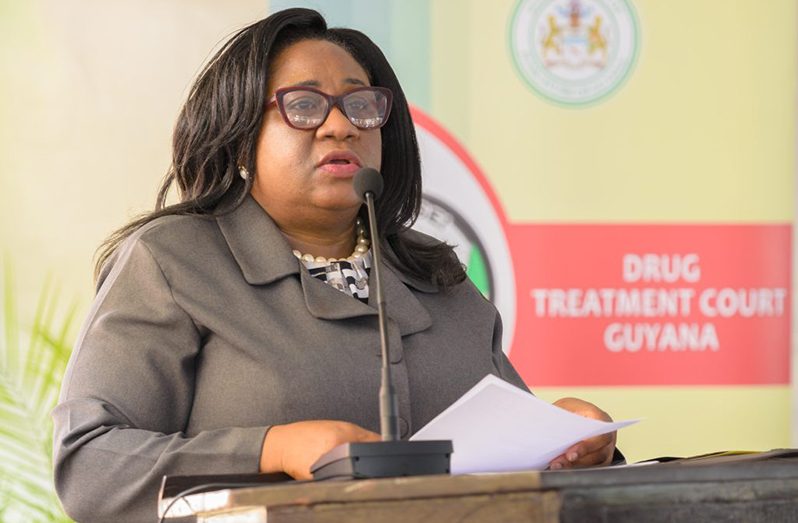IN observance of World Day Against Trafficking in Persons (TIP), the Guyana Association of Women Judges (GAWJ) is hosting two activities to engage the public, via virtual platforms, on the scourge of TIP.
This year’s World Day Against TIP is held under the theme “Use and abuse of technology” which focuses on the role of technology as a tool that can both enable and impede human trafficking.
As part of its activities, the GAWJ is hosting a live panel discussion on radio station 104.1FM at 07:30 hrs this Thursday.
The discussion will include GAWJ members, and representatives of the Guyana Police Force (GPF), the Trafficking in Persons (TIP) Unit of the Human Services and Social Security Ministry, and the International Organisation for Migration (IOM) – the United Nations’ migration organisation.
Guyana’s Chief Magistrate and GAWJ President, Ann McLennan, during an interview on 94.1 FM with Gordon Moseley, on Tuesday, gave a brief overview of the upcoming events.
The Chief Magistrate said the events will focus on the role of technology as a tool that can both enable and impede human trafficking.
According to the United Nations, with the global expansion in the use of technology – intensified by the COVID-19 pandemic and the shift of our everyday life to online platforms – the crime of human trafficking has conquered cyberspace.
“The internet and digital platforms offer traffickers numerous tools to recruit, exploit, and control victims; organise their transport and accommodation; advertise victims and reach out to potential clients; communicate among perpetrators, and hide criminal proceeds – and all that with greater speed, cost-effectiveness and anonymity,” the UN said in a statement to mark the international observance.
As such, in keeping with the theme, the GAWJ will be using the online medium to help create more public discussion aimed at understanding the judicial system.
“Although you may not see any cases coming through, we want to maintain that public confidence in the judicial system by bringing awareness to the general public about the protective measures that are in place for victims of trafficking in persons,” the Chief Magistrate said.
As part of their second event, the president of the GAWJ disclosed that the body will be distributing 150 TIP posters in all of the administrative regions, especially in areas where the crime is prevalent.
She added that the posters are intended to raise awareness and offer guidance to the public on how to recognise the crime and how to report it. The posters are available in English, Spanish, and Portuguese.
During the interview, the Chief Magistrate urged listeners to be on the alert for TIP crimes in their communities.
“It’s better to be safe than sorry,” she said, adding: “Some of the signs are persons who are forced [into] begging; we see that a lot around Georgetown. Frequent injuries or signs of abuse, appearing malnourished, working very long hours with very little rest and, sometimes, no pay or very little pay,” she said.
During last year’s observance, Sergeant Ranatha McBean of the Trafficking in Persons (TIP) Unit at the Guyana Police Force (GPF) disclosed that for the first five months of 2021, 42 females were trafficked for sexual exploitation.
According to McBean, between January and May 2021, the Force’s TIP Unit dealt with 14 reported cases involving 49 victims, which included three males.
Seven of the eight victims, who are under the age of 18, are Venezuelans, McBean’s data revealed. A total of 13 suspects were held by the police, resulting in 11 charges being laid.
Of those charged, one conviction has been recorded thus far. Some of the cases involved sexual or labour exploitation.
Guyana was recognised by the United States Government for fully meeting the minimum standards for the elimination of TIP. As a result, Guyana has remained on Tier 1 of the TIP index.
Guyana has also been recognised for its completion of a draft amendment of the Combating Trafficking of Persons Act, increased identification and investigation of trafficking-related matters, the launch of the first-ever bilingual anti-trafficking hotline, and the opening of shelters for trafficking survivors which are located outside of the capital city.
Due to the economic and political crisis, large numbers of migrants from Venezuela, Cuba, and Haiti continue to cross over the border into Guyana, seeking greener pastures, which has caused a large increase in the number of trafficking victims.





.jpg)








